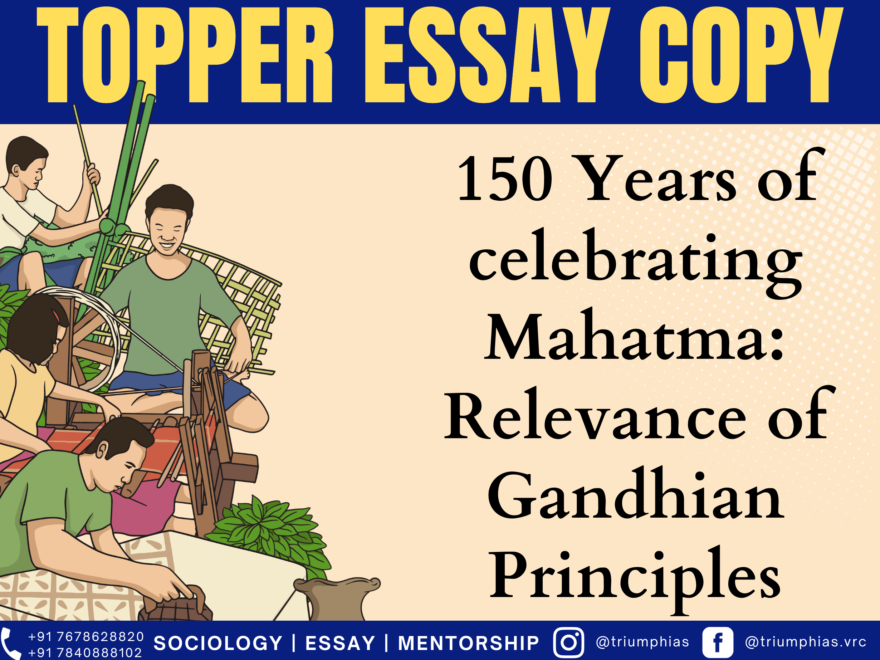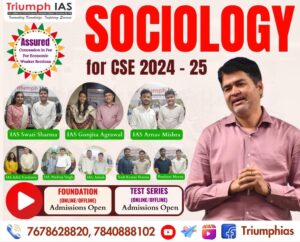Adarsh Kant Shukla

Essay Topic:
150 Years of celebrating Mahatma: Relevance of Gandhian Principles
(Relevant for Essay Writing for UPSC Civil Services Examination)
150 Years of celebrating Mahatma: Relevance of Gandhian Principles“The year was 1989; almost four decades after an untimely assassination of Mahatma Gandhi. In South Africa, the resistance of blacks, led by Nelson Mandela, had just manifested in the form of a successful Bus boycott program in Johannesburg. His inspiration, as Mandela said, was Mahatma Gandhi. The concerted efforts soon brought an end to Apartheid in South Africa. Two decades later, in the western powerhouse of the world – U.S.A., an African American takes the oath of U.S. President for the first time- His inspiration – once again, the khadi-clad ascetic- Mahatma Gandhi.” These two examples serve the purpose of explaining how much relevance Gandhian principles have in this era. In 2019, the world celebrated the eternal legacy of Mahatma Gandhi’s birth year; completing 150 years since 2nd October, 1869. Gandhiji had always been a consistent guide, philosopher, social reformer, political activist in the historical landscape of India. His ease of blending abstract concepts with simplistic illustrations made him dear to intellectuals of the upper strata to marginalized ones from the lower strata. His message to humanity finds resonance in this rapidly changing contemporary world, marred by uncertainty and anxiety. GANDHIAN PRINCIPLES: THE LIGHTHOUSE FOR HUMANITYIn his autobiography, “My Experiments with Truth”, Gandhiji illustrates how he was influenced by teachings that inculcated seeds of truth and altruism in his personality. Today Gandhiji is our Harishchandra, and it is time for us to take inspiration from his principles and values which permeate diverse aspects of human life; so that we can inculcate seeds of tolerance and fraternity just like him. The primary tenets of Gandhian principles are – Non-violence and satyagraha. His tryst with truth and peace was evident in his childhood when he admitted to his teacher that he had cheated to pass an exam. Similarly, at his Phoenix Farm in South Africa, nobody was allowed to rebuke or condescend anyone. Gandhiji used to provide peaceful arbitration of disputes. This quality of his proved instrumental in the later colonial struggle against the British when he leveraged Non-violence and Integrity as tools of courage against the British Empire, manifesting in civil disobedience movements and the Quit India movement. Despite being from a well-to-do family, Gandhiji never considered wealth as a marker of human reputation. According to his “doctrine of trusteeship”, the wealth of aristocrats is not for their private aggrandizement, rather they are mere trustees of the almighty who has and rich is – to help the needy on behalf of God. He considered the framework of resolving socio-political issues through his unique 7-sins principle – according to which, our society has seven sins that impede its development – knowledge without character, wealth without work, leisure without conscience, worship without sacrifice, politics without principles, commerce without morality, and science without humanity. According to Rajmohan Gandhi, “the most striking quality of Gandhiji was to make decisions which men of ordinary stature can never have the courage of”. The Gandhian principle of decision-making was based on the Gandhian Talisman- according to it – “Before making any decision, one should close his eyes and imagine the face of the most unfortunate and distressed person he has ever met and one must ponder whether his decision would affect that wretched soul and how”. Thus guiding our conscience. Relevance in the contemporary worldGandhian idea of Ahimsa is particularly relevant in our present Indian society as well as the global one. We are seeing an increasing number of custodial violence, mob lynchings, and hate crimes; which mirrors the increasingly disturbing trend of conflicts at a global level, e.g., the Shia-Sunni conflict in the Middle East to the threat of Nuclear proliferation in North Korea. We can use Gandhian ideas of peace resolution in this context by bringing all stakeholders to a single table. On the economic front, China is increasingly dominating global affairs through debt-trap diplomacy and wolf warrior pragmatism, but as Gandhiji said, “Commerce without morality is a social sin” which calls for a reset in the global supply chain and multilateral collaboration to balance global affairs. The instances of Religious revivalism are visible in the rise of ISIS and communal riots like the Delhi violence of 2019. This diverges from the Gandhian appeal of a non-sectarian society. Gandhi always maintained that a person must be pluralistic in outlook and monistic at heart. For him, tolerance was not just acceptance of diversity, it was active engagement with diversity with mutual give and take. This new approach towards tolerance must be emphasized at the global level. In the political arena, India is witnessing a new stream of “Resort politics”, “MLA purchasing”, and “horse trading”; which is a social sin (politics without principle). Gandhian politics never came in the way of morality, as witnessed in his resignation from Congress and his mutual respect towards Bose and Ambedkar despite ideological differences. Hence, our politics need a Gandhian touch of WELFARE-based politics and not convenience-based politics. “Men build enough walls but not enough bridges.” This is manifested in light of increased global protectionism and the US-China trade war. Gandhiji always stressed the need for international collaboration but limiting westernization at the same time. His socialism aimed at community welfare and the end goal of a state-less society. But today, states are consolidating their strength through means like immigration barriers, trade tariffs, etc.; which is detrimental for a cosmopolitan society and deprives developing countries of the advantage which once developed countries leveraged. Gandhian socialism never intended to harm the marginalized section through protectionism. Even when he organized the boycott of British cotton textiles, he personally visited Lancashire cotton mills to apologize to mill workers, such was his integrity. His love for the downtrodden “Harijans” and women’s emancipation needs to be institutionalized in the modern world. Every 10 minutes, a woman faces sexual abuse in India, 30% of hate crimes target Dalits in India while Gandhiji believed that no job is inferior, today Dalits are compelled to penury as 98% of manual scavengers are Dalits only. In this age of digital Narcissism, we need to remind ourselves that science without humanity is a social sin. The rise of Artificial Intelligence poses dangers to humanistic proclivities and ethical balance. Recently, a Microsoft AI named Tay was coaxed to provide sexist and racist remarks by mischievous agents. Thus, technology needs to be complemented by “Nai Talim” which emphasizes on value building along with technocracy. The pertinent challenges to human life are eminent in the form of climate change and conflict induced by it. Climate change is driving environmental refugees and social conflict, manifested in the Chad Basin of Africa. We need to reorient our priorities as Gandhiji used to say that the earth provides enough to satisfy every man’s needs but not every man’s greed. We need to balance our ecological footprints in accordance with natural well-being. Hence, in literature and in life, we do not pursue conclusion, but we pursue beginnings. We should begin to inculcate Gandhian values in ourselves and build a society envisioned by Gandhiji – self-reliant and morally upright. |
To master these intricacies and fare well in the Sociology Optional Syllabus, aspiring sociologists might benefit from guidance by the Best Sociology Optional Teacher and participation in the Best Sociology Optional Coaching. These avenues provide comprehensive assistance, ensuring a solid understanding of sociology’s diverse methodologies and techniques
Meta Tags:
Urbanisation, Blessing, Disguise, Economic Growth, Cultural Diversity, Environmental Challenges, India, Social Inclusion, Sustainable Development, SDG Goals, Urbanization is a blessing in disguise, Laxman Tiwari, Laxman Tiwari upsc, Laxman Tiwari CSE, Laxman Tiwari Essay copy, Laxman Tiwari Essay test copy

Why Vikash Ranjan’s foundation Classes for Essay?
Proper guidance and assistance are required to learn the skill of writing essay topics in CSE examination. VIKASH RANJAN SIR at TRIUMPH IAS guides students according to the Recent Trends of UPSC, making him the Best Essay Teacher for Essay writing UPSC.
At Triumph IAS, the Best Essay Writing Coaching platform, we not only provide the best study material and applied classes of Essay for IAS but also conduct regular assignments and class tests to assess candidates’ writing skills and understanding of the subject.
Choose The Best Essay Writing Teacher for IAS Preparation and Know our Approach for Essay?
- The Programme is Planned & Executed in a Way that You Write a good Essay for obtaining Effective Score of 140 Plus.
- In this programme we provide Classes on
- How to INTRODUCE The Topic in Context of the THEME of the Essay
- How to Elaborate & Explain the Topic-Theme on Temporal Scale & Sectoral Scale as well as Intellectual Scale in the MAIN BODY of the Essay.
- How to Sum up the Topic in CONCLUSION in Context of the Essay Topic Theme.
- ︎We will Teach You How to use the Knowledge Matrix of General Studies & Optional to write a Good Essay more Logically and Coherently.
- After the Classes You have to “Write to Learn & Learn to Score” .This means You have to Write the Essay Test Papers & Learn from the Feedback & Discussions.
Why Essay is Important and What We Offer in “Essay Test Series”?
- Triumph’s Essay Upgradation Test Series (Under Personal Guidance of Vikash Ranjan Sir) doesn’t only focus on improving student’s linguistic skills but also focus on improving student’s ability to comprehend the topic-sentence (subject) recall & relate the facts, concepts, propose thesis-statements, and logically assimilate the ideas & counter ideas with clarity in expression on temporal & Sectoral Scales of knowledge.
- Further students are provided one-on-one INTERACTION* Session with Vikash Ranjan Sir. Students get personal feedback on their strength and weaknesses, regarding what is ‘good about their essay and what more should be done to make it a better one’ by Vikash Ranjan Sir.
Why to take up this “Essay Test Series and Foundation” Course?
- Essay is Low hanging Fruit. Marks in Essay is Effectively Contributing in Final Selection in New Pattern of Mains Exam. With a Well Developed ‘Knowledge Matrix and Rigorous Practice’, One can Score upto 160 + in Essay. So IAS Aspirants should never Ignore Essay Preparation
- Inculcating Writing Competency in Essay for IAS, which is Different from Essay in English, Essay in School and College.
Follow us :
🔎 https://www.instagram.com/triumphias
🔎https://www.youtube.com/c/TriumphIAS
🔎https://t.me/VikashRanjanSociology
Find More Blogs…
| Compare and contrast Karl Marx’s and Max weber’s | Karl Marx- Historical Materialism |
| Position of Women In the Modern Indian Society | Sociology: Social system and pattern variables |
keyword: Relevance of Gandhian Principles, Relevance of Gandhian Principles, Relevance of Gandhian Principles, Relevance of Gandhian Principles, Relevance of Gandhian Principles, Relevance of Gandhian Principles, Relevance of Gandhian Principles, Relevance of Gandhian Principles, Relevance of Gandhian Principles, Relevance of Gandhian Principles Relevance of Gandhian Principles, Relevance of Gandhian Principles, Relevance of Gandhian Principles, Relevance of Gandhian Principles


